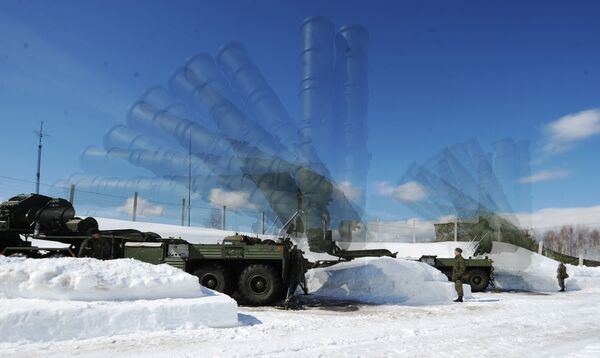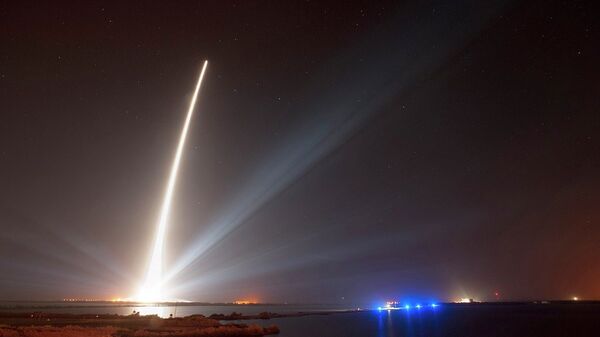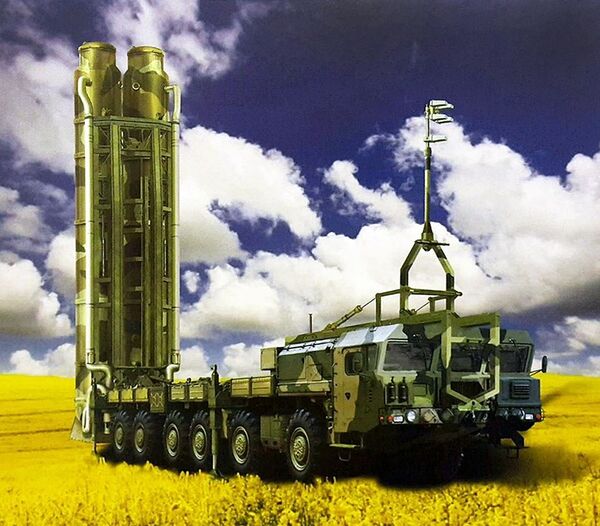"[There are] five proud branches of the United States Armed Forces — Army, Navy, Marines, Air Force and the Coast Guard. And we're actually thinking of a sixth. You probably haven't even heard that. I'm just telling you now…Because we're getting very big in space, both militarily and for other reasons, we're seriously thinking of the Space Force," the President said.
It wasn't the first time Trump had suggested the final frontier was the next sphere into which the US should extend its 'full spectrum dominance'. A mere month and a half prior, addressing a military audience at Marine Corps Air Station Miramar, San Diego, he'd boasted that his national security strategy — which included modernizing the US nuclear arsenal, developing hypersonic weapons, and drastically increasing military budgets — recognized "space is a war-fighting domain, just like the land, air, and sea."

"[President Trump] has prioritized space. He recognized the threats that have evolved, and the pace at which they evolve. He's very interested in exploring any options that can provide enhanced capabilities. The assessment of the space corps is one of those options getting close attention," explained Kenneth Rapuano, assistant secretary of defense for homeland defense and global security, March 15.
Nazis in Space
Trump's proposals have been ridiculed in some quarters — satirist Stephen Colbert has said he supports the idea "as along as JJ Abrams directs, and Mark Hammill has a cameo" — but intergalactic ambitions for the US empire are far from his alone.
The 2019 National Defense Authorization Act featured extensive references to space and "space warfighting operations," including plans to create a "unified command for space" under US Strategic Command — it was passed by Congress May 24, and awaits approval from the Senate.
However, he notes the program's effective roots date back even further — and have potentially sinister historical origins.
"Nazi rocket scientist Werner Von Braun created the V-1 and V-2 rockets during World War II. Following the war, the Pentagon brought Von Braun and a hundred scientists/engineers from his team, along with captured V-2s, to the Redstone Arsenal in Huntsville, Alabama to create the US space program. Russia launched the first satellite called Sputnik in 1957. The US used this event to stoke public fears Russia would dominate space, which ensured Washington gave Von Braun and his rocket team near-unlimited resources to respond to the Russian launch," Bruce told Sputnik.
Speaking at a congressional hearing in Washington in 1958, Dornberger insisted America's top space priority should to be to "conquer, occupy, keep, and utilize space between the Earth and the moon." In a subsequent address to a National Missile Industry Conference, he dismissed NASA's early activities as "space stunts" and urged more attention be given to space weaponry.
"Gentlemen, I didn't come to this country to lose the Third World War — I lost two," he explained.
Arms Race
Such developments have not gone unnoticed by other nations — and perhaps unsurprisingly, reaction has not been welcoming.
"Such a provocative stance has forced other countries, particularly Russia and China, to respond with their own space technology expansion. Moscow and Beijing have for many years gone to the United Nations, requesting a treaty banning all weapons in space be negotiated. The US has refused — and the result has been an expensive and destabilizing arms race in space," Bruce told Sputnik.

"There's presently so much space debris orbiting the Earth it must be tracked to ensure existing satellites and space stations aren't destroyed in a collision — any shooting war in space would create a cascading effect and likely put all nations' military and civilian satellites in jeopardy," Bruce told Sputnik.
Moreover, during the Barack Obama administration, the Pentagon escalated deployments of missile defense systems encircling Russia and China, key elements in 'first-strike' attack planning — they're also well-placed to strike ground stations, which communicate with orbiting military satellites, prime targets in any space war.
The space arms race isn't restricted to the international triumvirate of the US, Russia and China, either — India is aiming to build anti-satellite (ASAT) weapons, and Israel is in the process of creating an intercontinental ballistic missile defense system, Arrow-3. Several hundred Israeli troops are scheduled to visit Kodiak Island, Alaska to test the system from a launch complex — Bruce notes it was "built on the pristine fishing island against strong local protests." A planned launch in March 2018 was postponed "in order to achieve maximum readiness."
To say the least, none of these efforts come cheap. In fact, Bruce suggests the push by Presidents Obama and Trump for NATO members to increase their annual contributions to the "cancerous military alliance" is closely connected with the expense of preparing for space conflict.
"The aerospace industry has long claimed 'Star Wars' will be the largest industrial project in human history. The US can't afford to pay for the program by itself — Washington would have to stop spending on everything else to fund it — so all new NATO technology systems must be 'interoperable' with the US space warfighting program with the Pentagon in full control of this new high-tech tip of the spear," Bruce concludes.
The risk of a single power on Earth seizing control of space was inadvertently described in 1958 by then-US Senate Majority Leader Lyndon B Johnson.
"Control of space means control of the world, far more certainly, far more totally than any control that has ever or could ever be achieved by weapons, or by troops of occupation. There's something more important than the ultimate weapon. That is the ultimate position — the position of total control over the Earth that lies somewhere out in space. That is the distant future, though not so distant as we may have thought. Whoever gains that position gains control, total control, over Earth, for the purposes of tyranny or for the service of freedom," he said.
What was originally intended as a rousing call to exceed the Soviet Union's then-primacy in space exploration, 60 years later more closely resembles a prophet's curse on the verge of becoming reality.






